Why Are My New Brakes Squeaking When Stopping Slow? Facts & FAQ
-
Pete Ortiz
- Last updated:
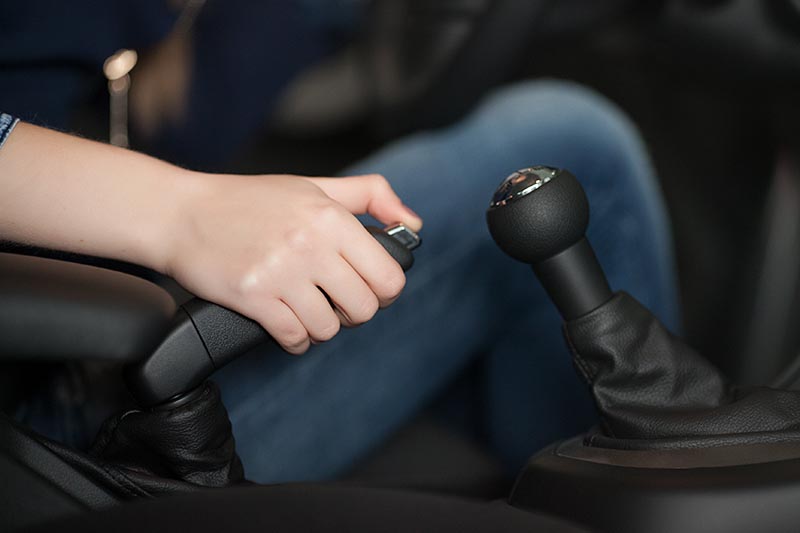
An eventual squeak isn’t surprising when you’re driving on worn brake pads, but few of us anticipate new brakes making sounds immediately after leaving the service center.
Most drivers know funky sounds tell us trouble is coming. Cars often warn us that they need attention if we want to dodge a costly repair or a severe safety issue. When fresh brakes start screeching and squealing as you stop slowly, does that mean they’re already running the risk of failing on the road?
While you shouldn’t ignore an abrasive sound with new brakes, you also don’t need to immediately stress over the thought of repairs. Squeaking is more common than most drivers realize. Learn the primary reasons your new brakes squeak when stopping slowly and how you can fix the issue as quickly as possible.
Why New Brakes Might Squeak
Squeaking and squealing noises occur when stopping due to high-frequency vibrations in the braking mechanism. Brakes typically begin to make noises when a component starts to wear out. Pads grind down until the wear indicator starts screaming at you. Eventually, the rotor can also wear or warp, necessitating replacement every 20,000–70,000 miles, depending on how hard you lean on the brakes.
Worn parts lack the vibration-dampening qualities that prevent high-pitched sounds. But even new brakes can give off an irritating sound due to environmental, physical, or usage factors.
Break-In Period
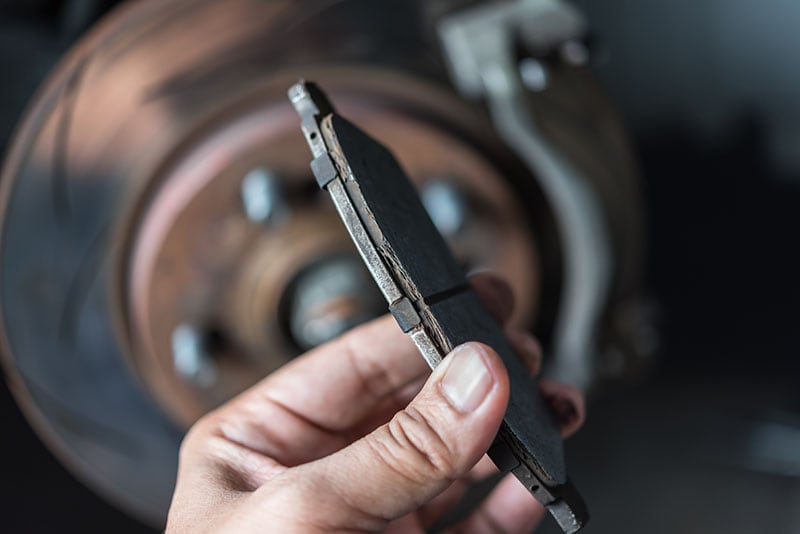
New brake pads and rotors don’t perfectly sync with one another from the outset. They need breaking in, or “bedding” in, a process that wears the pad’s surface layer and transfers an even layer of friction material from the pads to the rotors to optimize braking performance.
Properly breaking in new brakes involves a few rounds of rapid acceleration and deceleration. For safety, it typically requires a low-traffic, open stretch, such as an empty parking lot or private road. The first round involves quickly decelerating from 45 mph 4–5 times. After a brief cool-down period, you’ll perform a more aggressive deceleration from about 60 mph 8–10 times.
Some mechanics will bed in the brakes for you after replacing them. They may still have some breaking-in to do, so don’t be surprised if you continue to hear some squeaking after leaving the service center. An intensive bedding-in process isn’t always necessary for casual everyday driving, but it can often minimize the potential for squeaking faster.
Moisture Buildup
Settling moisture, frost, and ice on the brake pads and rotors may cause new brakes to squeal when you first drive your car. Humid days, overnight rain, and temperature fluctuations can lead to an early-morning sound that will typically dissipate as you warm up and use your brakes.
As they typically consist of cast iron, it’s not uncommon for brake rotors to develop a thin rust layer from moisture exposure, which can create an imperfect pad/rotor connection and cause vibrations. Like the initial layer of moisture and frost, this rust will generally wear off after a short drive around town, and you should hear the squeak disappear before long.
Dirty Brakes
Brakes wear down with use, especially if you frequently ride or slam on them. Dust from the brakes and other debris can accumulate over time. If it builds up behind the pad or between the pad and rotor, dirt will create enough space for those small vibrations that cause brakes to squeak when stopping slowly.
Brake dust can build in unsightly layers on the wheels. Clean them by removing the wheel and applying brake cleaner or a mild soap and water solution. A deep clean will allow you to inspect for glazing and wear that may contribute to squealing or performance issues.
Lack of Lubrication
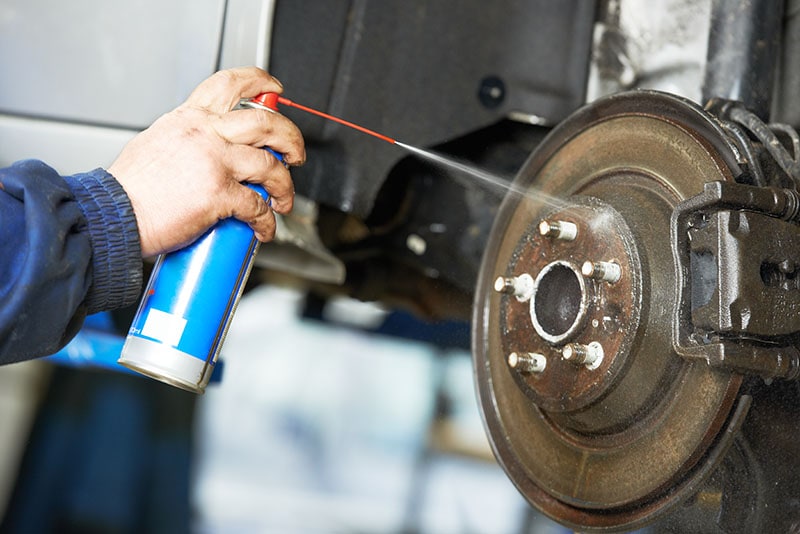
Replacing brake pads and rotors isn’t always enough to prevent squeaking. Moving components within the brake caliper also need to be in good condition.
For instance, the clips that hold the brake pads can loosen and wear out, causing squealing vibrations. They may even move out of place and occasionally contact the rotor, making a sound like a wear indicator. Quality brake pads often include new clips in the package, and mechanics typically check them during replacements.
The pins that guide the caliper when engaging the outer brake pad can also wear out. They must be well-lubricated and free of debris to fully compress and release when you let your foot off the brake. If they become compromised, the caliper may not completely move away, causing the brake pad to stick and emit an ongoing squeak against the rotor.
Lubricants can take care of a sticking brake pad. Lubricating the guide pins and the brake pad and clip connections will ensure smoother movement and fewer squeaks. Avoid getting lube on the brake pad surface or rotor, as it can prevent the brake from creating the proper friction and slowing the vehicle.
Improper Brake Pads
Using improper brake pads for your vehicle or driving style can cause uneven wear that contributes to squeaking brakes. Semi-metallic brakes, which can take the intense heat common to high-performance or heavy-duty cars braking under stressful loads, are the noisiest of any pads. If you put them on a daily driver, they’ll do an excellent job stopping, but they’ll also make more of a racket than your standard organic or upgraded ceramic pads.
Cheap Brake Pads
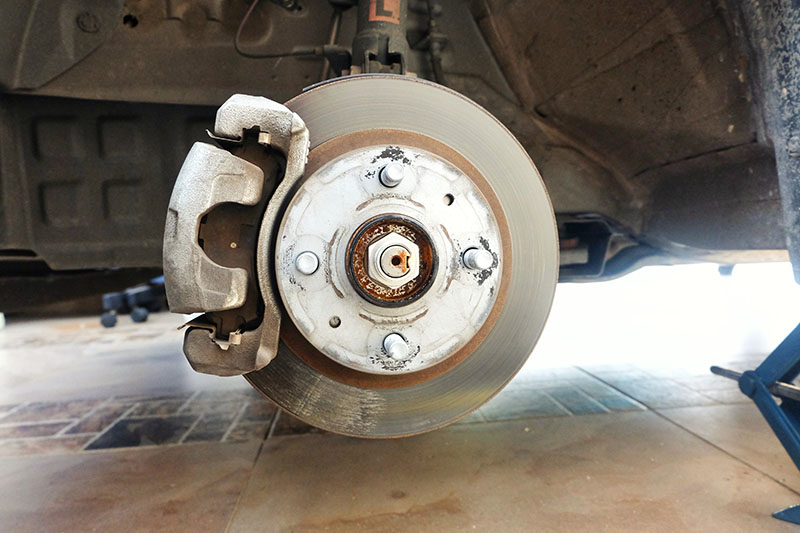
Cheap, poorly made brake pads can also have a high metal content that can add to a squealing problem. But the more common issue with low-quality pads is inferior anti-vibration features.
Disk brake pads have three essential layers — the brake pad wear surface, the metal backing plate, and a shim. The shim is a thin layer between the pad and the caliper responsible for noise reduction. A cheap, thin shim won’t absorb vibrations well and will be susceptible to squeaking. Some brake pads also don’t include a shim, though it’s unlikely your mechanic would swap out brakes without them.
If you feel your shims are the issue, you may be able to change them for higher-quality parts. Alternatively, adding a thin layer of paste/brake grease to the shims can be a cheaper and quicker way to dampen vibrations.
Heat and Glazed Pads
Glazing occurs when the friction material on the brake pads hardens from excessive heat. The hardened material forms a smooth, shiny surface, lowering the friction and increasing the braking distance. The crystallized pad surface can affect the rotor, creating deep gouges, pitting, and other damage.
Between a glazed pad and a damaged rotor, the setup is perfect for an annoying squeal alongside a substantial safety concern.
- Constant hard braking, especially at high speeds
- Keeping a foot on the brake pedal (“riding the brakes”)
- Frequent braking down steep declines
- Caliper failure causing incomplete brake disengagement
The heat from hard wear on new brakes can also warp the rotors. The brake pads won’t keep firm, consistent contact with it, causing the vibration. A squeaky noise during light braking is often a tell-tale sign of overheated and glazed brakes.
Glazing is uncommon with new brakes. Poor braking habits and intense driving conditions can hasten it and lead to premature brake noises. And if you only replace your pads, gouging and pitting on glazed rotors can continue the loud screech.
Fixing Glazed Pads
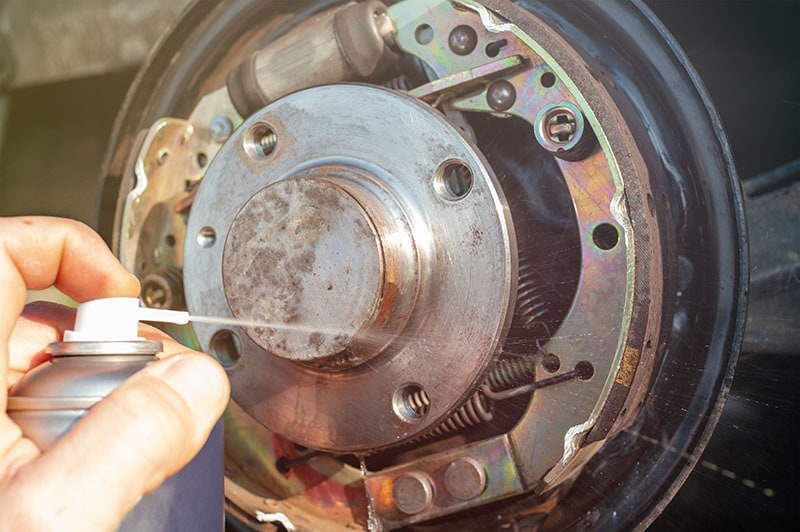
Minor glazing will sometimes work itself out if you correct your braking behaviors. When overheating leads to a structural change or damage to the pad and rotor, you’ll need to repair or replace them.
You can often sand off the glazed layer when the pad is in good condition. Likewise, if the rotor only shows signs of minor glazing and no warping, it may not need anything more than sanding and cleaning with brake cleaner.
Check your calipers while working on your brake pads and rotor. Failure in the clips that hold the pads could cause them to stick to the rotor when you disengage the brake. Like riding your brakes, this can lead to glazing and an eventual brake squeak.
Final Thoughts
Early-morning squeaks and squeals are normal for brakes, and they’ll typically go away before too long. But if your new brakes continue to squeak when stopping slowly, you should head back to the mechanic. Incorrect, faulty, or poor-quality pads may be to blame, or there may be a deeper issue at work. In any case, non-stop brake noise isn’t typically part of the deal at a service center, and it deserves immediate attention for your sanity and safety.
Featured Image Credit: Photos box, Shutterstock
Contents


